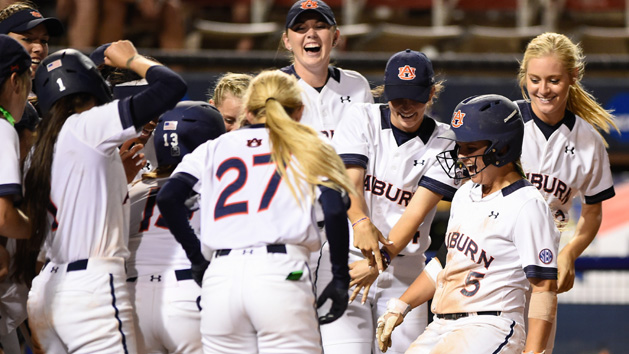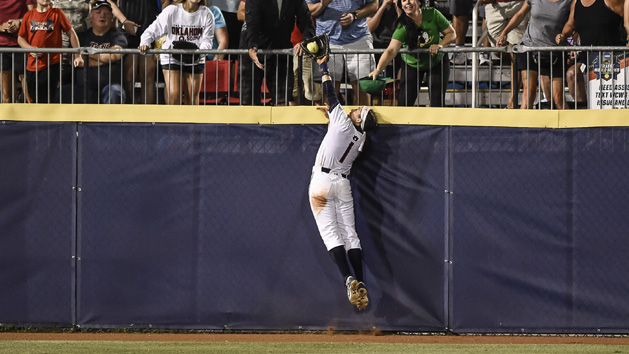
Our seats for the football game between Alabama and Auburn in 1972 were under the upper deck on Legion Field’s east side.
Alabama was undefeated; Auburn had lost only to LSU in Baton Rouge. Both were ranked in the Top 10.
The Tide dominated the game until late in the fourth quarter. Auburn’s offense had only 80 yards, but two near-identical blocked punts resulted in a 16-16 tie. Bill Newton blocked both kicks; David Langner ran both in for scores. Only a Gardner Jett extra point remained for the improbable victory.
My cousin, Myers, who was sitting to my left, didn’t clearly see the winning kick. His glasses bounced off his head and were stomped into pieces under the feet of people jumping up and down after the second touchdown. Screams from fans in that section let him know that Jett’s kick was good.
Somewhere in our basement is the yellowed front page of the next day’s New York
Times … not the front sports page, the front page … heralding the 17-16 win. A Birmingham News headline read “Punt, Bama, Punt.” The game is known by that simple name 44 years later.
In November, 2013, I covered the renewal of that rivalry at Jordan-Hare Stadium in Auburn. It was the 51st consecutive Iron Bowl that I had attended either with a press pass or with a ticket.
Ironically, again Alabama was undefeated and Auburn had lost only to LSU in Baton Rouge. Both were ranked in the Top 4. And again late in the game, Auburn trailed by just a touchdown. Nick Marshall’s scoring pass to Sammie Coates tied the game at 28-28, setting the stage for the final second.
Every college football fan on the planet knows what happened. Alabama coach Nick Saban decided to try a long field goal. Auburn coach Gus Malzahn sent in the SEC’s leading kick returner and set up blocking down the home side of the field. Chris Davis caught the ball nine yards deep in the end zone and the next person he touched was the first of his Tiger teammates to mob him in the winning end zone 109 yards away.
The win ended Alabama’s national title hopes, sent the Tigers to the SEC Championship Game, and paved the way for Auburn to play for the national championship for the second time in four years.
“Kick-Six” is how the game will always be known, and Davis’ kick return has been called the greatest play in college football history.
Until Tuesday night, those plays were the most memorable, significant, dramatic in all of Auburn athletic history regardless of the sport, whether played by men or women.
Not any longer.
The game played in Oklahoma City on Tuesday night immediately joined those other two games as the greatest in Auburn history … and among the greatest in all of college sports.
That’s a big statement, but think about it.
By the middle of the second inning, Auburn had three outs and Oklahoma had seven runs.
An aerial shot of the field showed a small patch of orange behind the Tigers’ dugout. The rest of the stands, including the outfield bleachers, was a sea of deep red, looking like a home game at Arkansas, Alabama … or Oklahoma, whose home stadium is only 20 miles away in Norman.
Auburn had never played for a softball national championship. Oklahoma had won two national titles, including one just three years before, winning over another SEC team, Tennessee. The Sooners had won 31 consecutive games, not losing since April 2.
It was the biggest stage in the sport. The national championship game. All of the pressure was on Auburn. With a loss, Oklahoma would come back to the same field the next night. With a loss, Auburn would come back to Lee County. And before the slower fans had even made it to their seats with popcorn, the Tigers were already behind by a touchdown and extra point.
Could there have been a more unlikely scenario for a comeback to happen with more on the line?
After their second at-bat, the Sooners never scored again. Auburn scored in several innings, scattering hits and smashing long balls, the last one sailing over the center field fence in the bottom of the eighth – not only a walk-off win, but a grand slam walk-off win. The 11-7 Tiger victory was the largest comeback margin in College World Series history, tying the seven-run deficit overcome by Baylor against Kentucky several years ago.
How many heroes can you have in one game?
Start with Whitney Jordan, the sophomore from Athens, Ala., who began the season as third-team shortstop, but was forced into the starting lineup when two upperclassmen ahead of her suffered devastating injuries. Oklahoma’s early seven-run outburst happened in part due to two errors by Jordan. Then, it was Jordan’s three-run home run that started the Tigers’ comeback.
Go to senior Rachael Walters, the winningest pitcher in Auburn history, who had pitched in the 2015 College World Series. During the latter part of the season, she and other senior throwers had seen decreased action. But she entered during the nightmare second inning, replacing first-year pitcher Kaylee Carlson from California, a North Carolina Tar Heel transfer, who had been the leader of the staff. Walters shut down the Sooners until the seventh inning while Auburn tied the score and took the momentum.
There was Tiffany Howard, another senior, the SEC hits leader for the 2016 season. She helped win the game at the plate, getting four hits, including three singles and a triple, and scoring three times. But, in right field in the sixth inning, she made the play of the game, one of the greatest plays in softball history.

With one runner on base, Oklahoma’s power hitter Shay Knighten hit the ball out of the park. It was over the fence, gone. Knighten had already rounded first base, thrusting her fist above her head in a home run sprint. The score was going to be 9-7 in favor of Oklahoma with Auburn running out of at-bats.
But, somebody forgot to tell Howard. As she had done countless times on the practice field, she found the wall, found the ball, and timed her jump perfectly, extending her arm over the fence to catch the home run in the web of her outstretched glove. She said that she had “always dreamed of making that play.” Oklahoma’s final scoring threat was over.
And, then, Emily Carosone. With runners on first and second in the bottom of the eighth and only one out, Oklahoma walked Kasey Cooper, the first-team All-American, the program’s all-time career leader in home runs and runs batted in. Next up was Carosone, the second-team All-American, the second leading all-time team career leader in RBIs and home runs.
It just took one pitch. As Carosone said after the game, “I went up to just hit the ball hard. I knew that if I hit it hard, we would score.” She was right. She hit it hard enough to comfortably clear the center field fence and Auburn did score … four times.
After the game, an ESPN announcer said, “We’ll see those plays over and over for as long as they have this event.” Her co-anchor said, “And every time it will be just as exciting.”
Just like with those iconic football plays.
In the greatest comeback in softball history, in a game for the national championship, contested by the boisterous Oklahoma Sooner home crowd and with overwhelming odds against them, Auburn did the seemingly impossible.
Of course, the tournament was all about the national championship, so there was one more game to be played.
But, after what happened on Tuesday night, the next game would be sort of anti-climactic regardless of which team won. No matter what happened, it couldn’t match Game 2. For sure, without the incredible, improbable game the night before, the third game would never have been played.
Oklahoma bounced back to take the title, 2-1, on Wednesday night. Ace lefthander Paige Parker, the nation’s top pitcher, winner of 27 consecutive games, got the victory for the Sooners. Each team had only five hits in a classic pitching duel.
The loss can’t detract from Auburn softball’s season. It produced a second consecutive SEC Tournament championship, 58 wins, and an appearance in the semi-final round of the College World Series in back-to-back seasons, this time going to the final series, ending just a game short of hoisting the championship trophy.
Don’t be surprised if Clint Myers coaches more Auburn teams in Oklahoma City. But whatever happens then, nothing will ever take away or diminish what happened on Tuesday night.
Bill Newton, David Langner and Chris Davis.
And, now, Tiffany Howard and Emily Carosone.
For Auburn fans, and softball fans everywhere, memories of what happened in Oklahoma City will be around for a long, long time.
